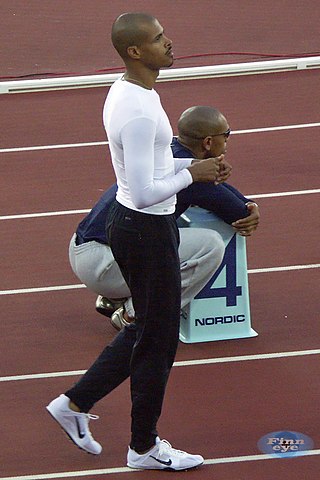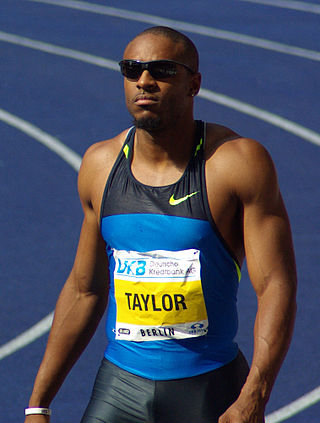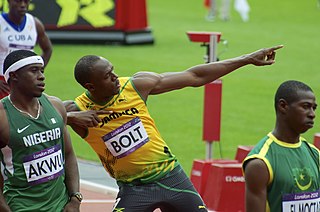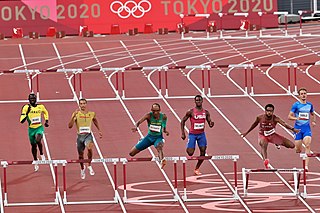
The men's 400 metres hurdles at the 2004 Summer Olympics as part of the athletics program were held at the Athens Olympic Stadium from August 23 to 26. There were 35 competitors from 24 nations. The event was won by Félix Sánchez of the Dominican Republic, the nation's first medal in the men's 400 metres hurdles. Silver went to Danny McFarlane of Jamaica, returning to the podium in the event for the first time since 1992. Naman Keïta's bronze was France's first medal in the event in over 100 years; the last Frenchman to medal in the long hurdles was Henri Tauzin in 1900. The United States' five-Games gold medal streak ended; for only the second time in the history of the event, Americans competed but won no medals.

The men's 400 metres hurdles at the 2008 Summer Olympics took place on 16–18 August at the Beijing National Stadium. There were 26 competitors from 19 nations. The event was won by Angelo Taylor of the United States, the nation's 18th victory in the men's 400 metres hurdles. Taylor was the seventh man to win multiple medals in the event, and third to win two golds. The United States completed its fifth podium sweep in the men's long hurdles, as Kerron Clement and Bershawn Jackson took silver and bronze.

The men's 400 metres hurdles at the 2000 Summer Olympics as part of the athletics programme were held at Stadium Australia on Sunday 24 September, Monday 25 September and Wednesday 27 September 2000. There were 62 competitors from 45 nations. The event was won by 0.03 seconds by Angelo Taylor of the United States, the nation's fifth consecutive and 17th overall victory in the event. Saudi Arabia and South Africa each earned their first medals in the men's 400 metres hurdles, as Hadi Souan Somayli took silver and Llewellyn Herbert received bronze.

Javier Culson Pérez is a Puerto Rican athlete and Olympiad bronze medalist who specialises in the 400-metre hurdles. After becoming involved with the discipline in his late teen years, he entered the podium in some regional youth events, including the Pan American Junior Athletics Championships. Culson is a two-time silver medallist at the International Association of Athletics Federations's (IAAF) World Championships and an elite contender in the Samsung Diamond League, where he finished second overall in 2011. He has also garnished medals in events with lower profiles, including the Central American and Caribbean Games and the Ibero-American Championships. He currently holds the record as "the world's fastest man" in that category. Culson also competed at the 2012 Olympics in London winning the bronze medal in the 400-metre hurdles race. In the 2016 Olympics in Rio, Culson made it all the way to the finals of the men's 400m hurdles only to be disqualified by a false start.
The men's 400 metres hurdles at the 2009 World Championships in Athletics was held at the Olympic Stadium on 15, 16 and 18 August.

The men's 400 metres hurdles event at the 1932 Olympic Games took place on July 31 and August 1 at the Los Angeles Memorial Coliseum. There were 18 competitors from 13 nations. The 1930 Olympic Congress in Berlin had reduced the limit from 4 athletes per NOC to 3 athletes. The event was won by Bob Tisdall of Ireland, the nation's first medal in the event in its 400 metres hurdles debut. The United States took silver and bronze, extending its streak of taking at least silver in all 7 appearances of the event to that point. Taylor became the first man to earn three medals in the event, adding to his 1924 gold and 1928 bronze. Defending champion David Burghley of Great Britain finished fourth.

The men's 400 metres competition at the 2012 Summer Olympics in London, United Kingdom, was held at the Olympic Stadium on 4–6 August. Forty-nine athletes from 38 nations competed. The event was won by 0.52 seconds by Kirani James of Grenada, earning the country its first Olympic medal. Luguelín Santos's silver was the Dominican Republic's first medal in the men's 400 metres. Lalonde Gordon's bronze was Trinidad and Tobago's first medal in the event since 1964.

The men's 110 metres hurdles competition at the 2012 Summer Olympics in London, United Kingdom was held at the Olympic Stadium on 7–8 August. Fifty-three athletes from 33 nations competed. The event was won by Aries Merritt of the United States, the nation's first championship in the event since 1996 and 19th overall. Hansle Parchment's bronze was Jamaica's first medal in the men's high hurdles.

The men's 200 metres competition at the 2012 Summer Olympics in London, United Kingdom was held at the Olympic Stadium on 7–9 August. There were 54 competitors from 40 nations. The event was won by Usain Bolt of Jamaica, the first man to repeat as champion in the 200 metres. His teammates Yohan Blake (silver) and Warren Weir (bronze) completed the medal sweep; it was the seventh sweep in the men's 200 metres and the first by a nation other than the United States. Bolt's gold medal was Jamaica's third in the event, moving out of a tie with Canada and Italy for second-most overall.

Puerto Rico competed at the 2012 Summer Olympics in London, United Kingdom from July 27 to August 12, 2012. This was the nation's seventeenth consecutive appearance at the Olympics.
The Men's 400 metres hurdles event at the 2011 World Championships in Athletics was held at the Daegu Stadium on August 29, 30 and September 1.

The men's 400 metres hurdles at the 2013 World Championships in Athletics was held at the Luzhniki Stadium on 12–15 August.

The men's 100 metres event at the 2016 Summer Olympics took place between 13–14 August at the Olympic Stadium. 84 athletes from 57 nations competed.

The men's 400 metres event at the 2016 Summer Olympics took place between 12 and 14 August at the Olympic Stadium. Fifty-three athletes from 35 nations competed. The event was won by 0.73 seconds by Wayde van Niekerk of South Africa, who broke the world record in the 400m and won the nation's second gold medal in the men's 400 metres. Kirani James of Grenada and LaShawn Merritt of the United States became the sixth and seventh men to win two medals in the event, but Michael Johnson remained the only man with two gold medals.

The men's 110 metres hurdles event at the 2016 Summer Olympics took place between 15–16 August at the Olympic Stadium. Forty athletes from 27 nations competed. The event was won by Omar McLeod of Jamaica, the nation's first gold medal and second medal overall in the event. Orlando Ortega's silver was Spain's first medal in the men's high hurdles, while Dimitri Bascou's bronze was France's first medal in the event since 1976.

The men's 400 metres hurdles event at the 2016 Summer Olympics took place between 15–18 August at the Olympic Stadium. There were 47 competitors from 33 nations. The event was won by Kerron Clement of the United States, the nation's 19th victory in the men's long hurdles. Clement became the ninth man to win multiple medals in the event. Both Kenya and Turkey earned their first medals in the men's 400 metres hurdles, the former with Boniface Mucheru Tumuti's silver and the latter with Yasmani Copello's bronze.
The men's 400 metres hurdles at the 2015 World Championships in Athletics was held at the Beijing National Stadium on 22, 23 and 25 August.

The men's 400 metres event at the 2020 Summer Olympics took place between 1 and 5 August 2021 at the Olympic Stadium. Approximately fifty athletes were expected to compete; the exact number was dependent on how many nations use universality places to enter athletes in addition to the 48 qualifying through time or ranking. 48 athletes from 33 nations competed. The event was won by 0.23 seconds by Steven Gardiner of the Bahamas, with Anthony Zambrano of Colombia taking silver. Those were the first medals in the men's 400 metres for each of those two nations. Kirani James of Grenada won his third consecutive medal in the event with his bronze, making him the first man to earn three medals in the 400 metres.

The men's 110 metres hurdles event at the 2020 Summer Olympics took place between 3 and 5 August 2021 at the Olympic Stadium. Approximately forty athletes were expected to compete; the exact number was dependent on how many nations used universality places to enter athletes in addition to the 40 qualifying through time or ranking. 40 athletes from 29 nations competed. Hansle Parchment of Jamaica won the gold medal, the nation's second consecutive victory in the event. His countryman Ronald Levy took bronze. American Grant Holloway earned silver, placing the United States back on the podium in the event after the nation missed the medals for the first time in Rio 2016.

The men's 400 metres hurdles event at the 2020 Summer Olympics took place between 30 July and 3 August 2021 at the Olympic Stadium. 36 athletes from 26 nations competed.














